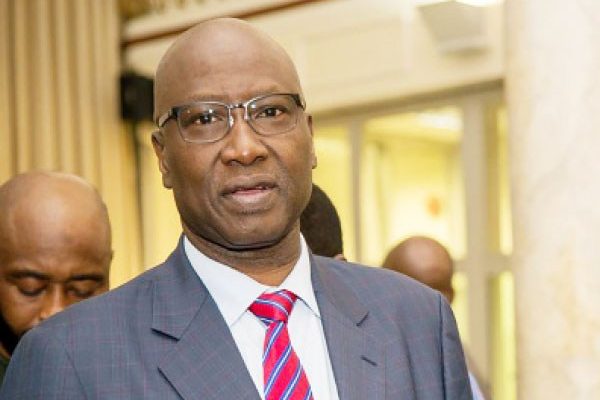ECONOMY
FG pledges policies, effective service delivery for good of Nigerians

Mr Boss Mustapha, the Secretary to the Government of the Federation, says the Federal Government is committed to actualising the advantages of its policy objectives for the greater good of the nation.
Mustapha gave the assurance during a meeting of Secretaries to State Governments and Permanent Secretaries of the Cabinet Affairs Office of States in South-West Geo-Political Zone in Lagos on Thursday.
He was represented by Dr Habiba Lawal, Permanent Secretary, Ecological Fund Office, Secretary to the Government of the Federation.
He said that the development of any country largely depended on the policy options the government chose and implemented.
According to him, sound policy brings out good public policies and effective service delivery; although it is dependent on the political will to follow through to implementation.
“It is, therefore, our duty to ensure that we take full advantage of this opportunity to advance good policy options for the greater good of our nation.
“I know the task is enormous but with renewed zeal and total commitment to our mandates, we shall deliver.
“This meeting is a follow-up to the maiden meeting of the Secretaries to State Governments and Heads/Permanent Secretaries of Cabinet Affairs Office (CAO) of the Federation held on May 2 in Abuja.
“The meeting is designed to further develop synergy between CAOs at the federal and state levels for empowered delivery of service,” Mustapha said.
He said that what was done in Lagos would be replicated in other five geo-political zones of the country; followed by South-East, South-South, North-West, North-East as well as North-Central.
Mustapha said that experience of global best practices showed that as states and indeed nations continued to face budgetary constraints, policy makers looked for ways to make government more responsive to the aspirations of the people.
Contributing, the Governor of Lagos State, Mr Babajide Sanwo-Olu, said that both CAOs and Federal officers performed similar functions critical to the efficient functioning of government policies. He was represented by Mrs Folashade Jaji, Secretary to the Lagos State Government.
The governor said that such responsibility was at the very core of governance, adding that it was the yardstick with which the effectiveness of government programmes and policies were measured.
“This initiative, which is being supported by the UK government, Departments for International Development, Partnership to Reform and Learn, (DFID-PERL) is commendable.
“This will also afford the leadership and officials’ opportunity to share experiences, develop practical and sustainable solutions to common challenges and improve their capacity through exposure to global best practices.
“As Chief Executive, we will continually rely on the capacity, competence, experience and good judgment of officials charged with key responsibilities such as the CAOS.
Sanwo-Olu expressed optimism that development would ensure that the policies were not only perfect in design, but also in implementation.
Mr Babatunde Lawal, the Permanent Secretary, Cabinet Affairs Office, said that the meeting meant to discuss “the modalities for operationalising the proposed Community of Practice (CoP), for CAO of the Federation”, was very apt.
Lawal said that the meeting was also in consonance with the joint resolve to ensure effective implementation of the country’s development agenda, the Economic Recovery and Growth Plan (ERGP).
ERGP is a medium term all-round developmental initiative which focuses on restoring growth, investing in people and building a globally competitive economy.
He said that for efficient discharge of these responsibilities, the capacities of the staff of CAO would need to be further developed and the office re-positioned to deliver on its mandate.
Mr Odu Obibueku, Reform Regulation Manager, Federal Lead DFID-PERL, said that the organisation was humbled to be associated with this noble endeavour.
He further said Federal Lead DFID-PERL was inspired that the use of CoP as tool for peer learning and exchange had delivered results in its previous applications.
These previous applications, he said, include inter-governmental learning and practice among others.
Obibueku said that during the course of the meeting the Federal Lead DFID-PERL would provide an overview of a CoP; that is, Portola structures; processes; tools and technology for COP’s.
The Head of Service of the Federation, Mrs Winifred Oyo-Ita, said that her office had secured the approval of the Federal Executive Council (FEC) to build the skills and knowledge of the federal workers
Such workers, she said were expected to provide leadership and deliver on National Development Goals under the 2017-2020 Federal civil service strategy and implementation plan.
Oyo-Ita was represented by Dr Ajani Magdalene, Permanent Secretary, Service Policies and Strategy, office of the Head of Civil Service of Federation.
Oyo-Ita said that her office would soon implement action on hand-on capacity training programme for all Federal civil servants on grade levels 07 to 16.
She said that this would be facilitated by Manpower Development Institutions (MDI) such as Public Service Institute of Nigeria (PSIN) and Administrative Staff College of Nigeria (ASCON).
In his good will massage, the Director- General of the Development Agenda for Western Nigeria (DAWN), Mr Seyi Oyeleye, said that DAWN was a technocratic institution set up by the six Southwestern states in July 2013 to coordinate and facilitate their regional cooperation and integration programmes.
Oyeleye said that DAWN focused on five development pillars:Economic Development and Investment; Social and Human Development; Infrastructure Development; Good Governance and Inclusive Institutions Homeland Affairs.
He said DAWN was also the implementation partner of DFID’s funded Partnership to Engage, Reform and Learn (PERL) – “the facilitator of this meeting being held in the Southwest Region. “
“This cooperation is essentially initiated to enable collaborative approach toward resolving problems with resonance among members.
“Participating States will not only have the benefit of economy of scale but also aid optimisation of limited resources,” Oyeleye said.




 Davido's Net Worth & Lifestyle
Davido's Net Worth & Lifestyle 
